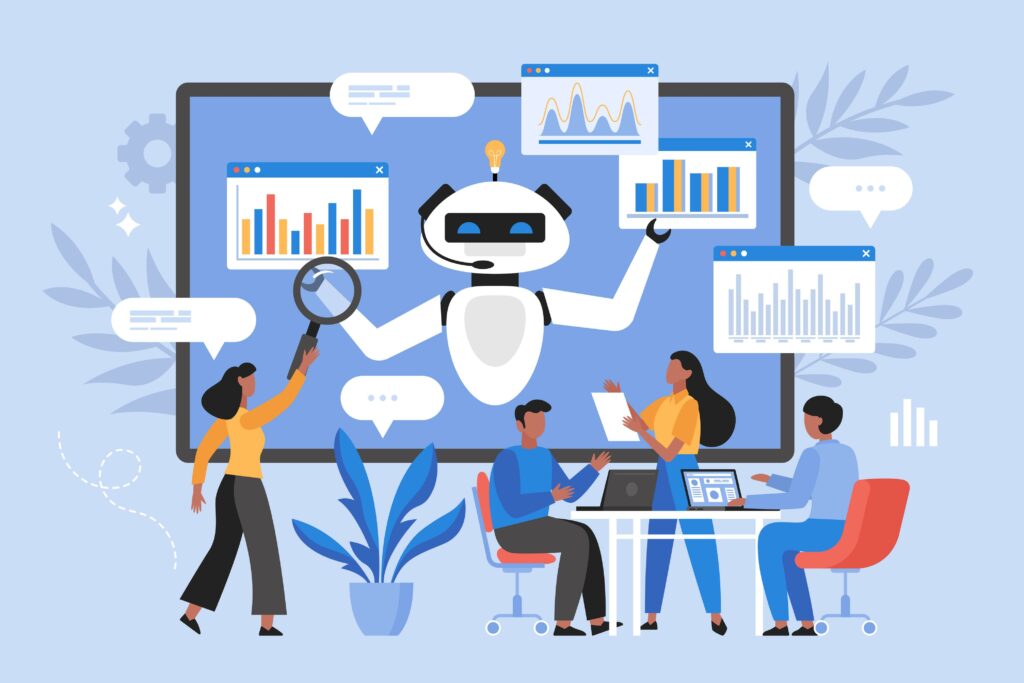Artificial intelligence has evolved into a powerful tool for all businesses. It has made its way into every aspect of business and succeeded in becoming a crucial element of our work lives. This is thanks to AI’s two most critical features: user-friendliness and time efficiency. Similarly, the impact of AI on digital marketing is particularly noteworthy. AI is widely applied in digital marketing for automating tasks, personalizing content, organizing leads, analyzing and predicting customer behavior, and much more.
How AI is Changing Digital Marketing
AI has opened new avenues for users to search and be found online. Using AI, you can get tailored recommendations for all your needs and have easy access to information. Most brands today, use AI as a means to interact with customers. Chatbots, for instance, are now immensely popular with businesses, since they handle a large part of the initial communication with customers and prospective clients.
As far as digital marketing is concerned, AI has been a game-changer. According to HubSpot Blog’s ‘State of AI Report’ here are some noteworthy findings:
- 64% of the marketing professionals surveyed said that they used AI in some form in their jobs.
- Out of those who have already invested in AI, 71% experience positive ROI, and 72% feel that AI makes their employees more productive.
- 95% of the marketing professionals using AI reveal that it helps them spend less time on manual tasks, allowing them to dedicate their time and efforts to more important and enjoyable aspects of their roles.
- 85% of the AI users in sales reveal that AI has made prospecting efforts more effective
- According to 63% of marketers, content made with generative AI performs better than content made without it.
AI has therefore had a transformative effect on digital marketing. It is widely used in content creation, market research, data analysis, social media marketing, email marketing, blogging, and search engine optimization. However, as with any other form of technology, the use of AI in digital marketing has its benefits and drawbacks.
Benefits of Using AI in Digital Marketing
Increases Productivity:
The ability of AI to automate tasks enables you to free up your valuable time for more important aspects of your job. This allows you more time for strategic and creative initiatives, thus boosting productivity.
Improves Speed and Efficiency:
According to the HubSpot Report, a number of digital marketers using AI feel that the biggest advantage they see is time-savings. They reveal that you can save up to three hours for every piece of content you create using generative AI.
-
Data-Driven Marketing Decisions & Better ROI:
The purpose of using AI in digital marketing is to boost performance and ROI for your campaigns. AI offers the power of data analytics and insights into customers and their needs. You can harness the power of this data to analyze, predict, and create better campaigns that bring greater ROI. These capabilities make scaling your business much easier.
-
Enhanced Customer Experience:
AI goes a long way in improving your relationship with your customers. It enables you to personalize recommendations and build deeper relationships with your customers, thus improving brand loyalty. The abilities of AI extend as far as identifying customers at risk of churn and using automated campaigns to re-engage them with your business.
Downsides of Using AI in Digital Marketing
-
Factual Errors & Inaccuracy:
47% of digital marketers in the HubSpot study have revealed that generative AI came up with inaccurate information. This means that if you are using AI to generate content that doesn’t go through a human edit, it may lack quality. AI-generated content needs to be accurate and timely for successful and efficient use. However, factual inaccuracies and biases have been reported in AI-generated content. Therefore, using AI requires human oversight to avoid these errors.
-
Privacy and Security Concerns:
With increased personalization in marketing, customers’ personal information is becoming increasingly valuable. Some AI techniques in digital marketing, such as hyper-targeted advertising, require using customers’ cookies and internet behavior to predict future purchases. Therefore, if you are using AI for digital marketing, you are required to comply with all the privacy laws applicable to your business in your country.
-
Need for Upskilling:
Although AI tools are easily accessible to digital marketers, you need skills and knowledge to use them effectively. Therefore, when you invest in AI solutions, it becomes necessary for your team to upskill and get hands-on experience with them, to use them more efficiently.
-
Transparency & Ethical Considerations:
One of the primary concerns with using AI for generating marketing content, is the fact that there is no transparency in the decision-making processes of AI tools. The lack of ability to understand and trace how AI systems make decisions gives rise to questions about plagiarism, authorship, and intellectual protection.
These considerations about the impact of AI on digital marketing lead us to the most pertinent question:
Is AI Going to Replace Digital Marketers?
The answer is ‘No’. Although AI can simplify and perform most tasks with greater speed compared to humans, it can never replace humans. Human intervention and review are crucial to optimizing the outputs generated by AI. The key is to use AI as a tool to plan, channel, and optimize your digital marketing efforts.
AI brings with it, the unmatched potential to leverage data analytics. This allows you to personalize messages for your target audience and engage them at a much deeper level. If used responsibly, AI tools can add great value to your marketing strategy and drive better results.


